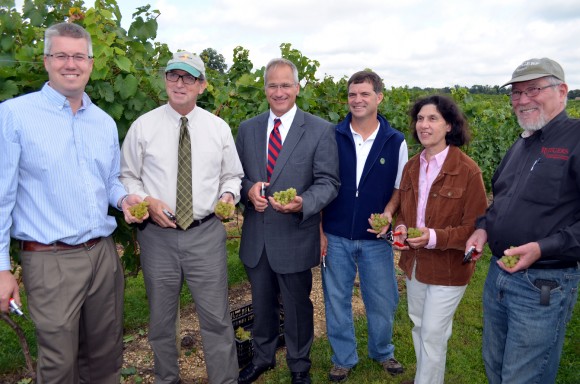The winemakers’ art relies on the cultivation of select varieties of well-adapted grapes that thrive under sets of conditions unique to every site. The French have a single vocabulary word, “terroir,” to describe this broad set of interacting factors that includes the soils, their orientation, grape variety, farming practices, climate, local microclimate, wine making culture and technology. According to the New Jersey Department of Agriculture, New Jersey has 50 licensed wineries and is 10th in the nation in wine production, with 1.6 million gallons produced in 2012. In 2013, New Jersey wineries sold 447,425 gallons of wine.
New Jersey Gov. Chris Christie honored the wine industry for being a growing contributor to the state’s economy, signing a proclamation declaring September 19 to 28 as New Jersey Wine Week.

New Jersey Secretary of Agriculture Douglas H. Fisher visited Working Dog Winery in East Windsor on September 16 to announce the beginning of Wine Week in New Jersey, celebrating the Garden State’s 2014 grape harvest. Joining him to kick off NJ Wine Week are (l-r) Larry Sharrott, Chairman of the Garden State Wine Growers Assoc.; Secretary Fisher; Alcoholic Beverage Control Dir. Michael Halfacre; Mark Carduner of Working Dog Winery; East Windsor Mayor Janice Mironov; and Rutgers School of Environmental and Biological Sciences Executive Dean Robert Goodman. Photo: NJDA
To announce New Jersey Wine Week, New Jersey Secretary of Agriculture Douglas H. Fisher visited Working Dog Winery in East Windsor on September 16, celebrating the Garden State’s 2014 grape harvest. “New Jersey’s wineries are increasingly being recognized around the nation and the world for producing high quality and unique wines,” said Secretary Fisher. “The Garden State wine industry is an integral part of the state’s agricultural and tourism industries, contributing to the economy and preserving open space.”
Rutgers New Jersey Agricultural Experiment Station (NJAES) has a key role in supporting the state’s wine grape industry. Launched in 2014, the New Jersey Center for Wine Research and Education (NJCWRE) is a new partnership between industry and academia being developed by Rutgers NJAES to establish and support a comprehensive and interdisciplinary program of research and education in response to the needs of the wine industry of New Jersey.
“The New Jersey wine industry has expanded dramatically, more than doubling in size over the last decade,” said Brad Hillman, director of research at NJAES. “The large amount of farmland in New Jersey that is ideal for wine grape cultivation and a knowledgeable, sophisticated consumer public will combine to drive further expansion of local wineries and related businesses throughout the state. Providing robust educational programming and research support for this rapidly growing industry is the mission of the NJCWRE.”
The center will accomplish this by understanding and responding to the needs of the industry in areas such as varietal selection, viticultural methods, disease and pest management, production methods, economic analysis and business model implementation. “The opportunities for the wine industry in New Jersey are immense, and the NJCWRE is dedicated to helping the industry meet this potential,” added Hillman.
While Rutgers NJAES has had ongoing research and education on wine grapes for a number of years, NJCWRE Founding Director and Extension Specialist in Pomology Dan Ward emphasizes the timeliness of establishing the Center. “As the wine industry has grown, obtaining needed education and research support has become challenging and urgent. Rutgers NJAES is rising to that challenge through the establishment of this center. The NJCWRE is enhancing educational programming for the industry, increasing understanding of the industry and its needs, and creating opportunities for collaborative research to address pressing problems faced by grape growers and wine producers throughout the state.”
To celebrate New Jersey Wine Week, many New Jersey wineries have activities that extend into the fall and holiday season. For a listing of New Jersey wineries, visit the Jersey Fresh website.

